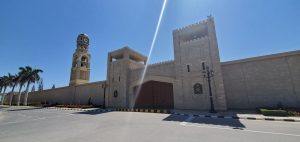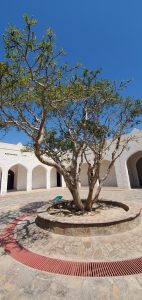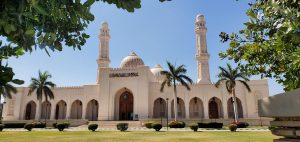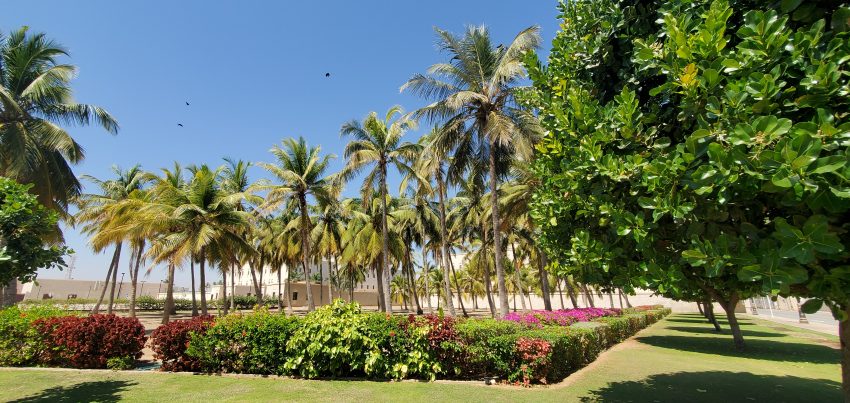There is an old saying, “timing is everything”, an expression which means that the “consideration of other events can greatly influence some desired outcome”. This sums up our stop in Salalah, Oman perfectly.
Our arrival in this port was on a Friday, the holy day of the week for Muslims. As a result many of the sites described in the excursion outline were either closed for the day or inaccessible to tourists. Despite the best effort of our guide Achmed, our planned itinerary had to change.
The day started with a delay processing the tourist visas necessary in order to leave the port which cut short the amount of time we had for our excursion. The ship did refund a portion of the cost which was more than fair. Having said all that there were some amazing aspects to this ship excursion.
 Oman was the southernmost stop in our cruise. Salalah is near the Arabian Sea with a mountain range behind and the desert further inland. Oman is famous for its production of frankincense; that of the gift from one of the Wise Men in the Bible. As someone who had no idea what it actually was (I’m still unsure about myrrh), I found this a very enlightening stop.
Oman was the southernmost stop in our cruise. Salalah is near the Arabian Sea with a mountain range behind and the desert further inland. Oman is famous for its production of frankincense; that of the gift from one of the Wise Men in the Bible. As someone who had no idea what it actually was (I’m still unsure about myrrh), I found this a very enlightening stop.
After a brief photo stop outside the Royal Palace we made our way to the Frankincense Museum. Frankincense is essentially the sap from the tree of the same name, similar in fact to maple syrup. It grows best with little water or humidity, perfect for the arid deserts of Oman. Once collected it is dried and sorted based on colour and quality, which also determines its use ranging from traditional medicinal uses to skin care and aromatic oils. 
Oman has a rich maritime history, evidence of which occupied a large area in the museum, and famous for its long stretches of beautiful beaches. Many of the beaches that we drove by were unoccupied despite the heat of the day, first due to it being a holy day, and second because it was their winter.
Next stop was an outdoor market where we got to sample coconut milk and fresh coconut as well as the sweet tiny bananas that are commonly grown in the area. Oman is home to papaya farms as well and boasts many lush flowers and palms. Despite it being mostly desert there is a monsoon season from July to September that helps to promote the vegetation and agriculture of the region.
Our tour was also supposed to include a visit to a mosque, which we could only take pictures of from the outside, and a stop at a souk (market) which was mostly closed. A few enterprising shop keepers opened for a few hours in the afternoon for the tourists but certainly not the selection of different shops we had hoped to see.

Although we opted for a ship excursion we spoke to fellow passengers who negotiated with taxis at the port for a tour of the area for about 180 – 200 Oman Rials. Their tour took them further into the mountainous regions. There was also a free shuttle that took you outside of the port if you wanted to explore the town on our own.
This is just one example of finding the best in what is offered even if it is not what you expected. Travel is often about embracing the culture of your destination, however you find it.
